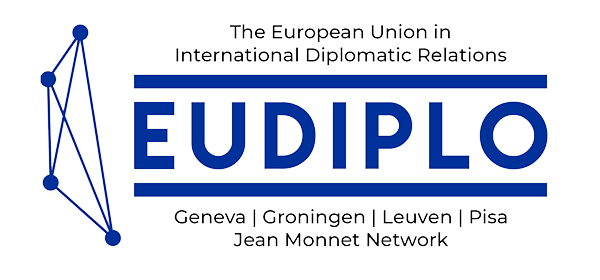The EU in International Diplomatic Relations: Challenges and Opportunities

The EU in International Diplomatic Relations:
Challenges and Opportunities
Kick-off Conference EUDIPLO Jean Monnet Network
www.eudiplo.eu
Friday 20 November 2020 | University of Pisa
Registration
https://us02web.zoom.us/meeting/register/tZUtf-GprzMjE9xTlwLY4LZKo-F5ypVghcAY
Objectives of the conference
The main aim of the conference is to examine the internal and external constraints for the European Union (EU) to enhance its capacities as an international diplomatic actor. Although the Union delegations and the European External Action Service (EEAS) have celebrated their tenth anniversary, there are still a number of constraints for the EU in acting as a diplomatic actor and overcoming the barriers of the ‘Westphalian’ setup of international diplomatic relations.
These constraints may be due, on the one hand, to the current allocation of competences between the EU and its Member States in the field of the Common Foreign and Security Policy (CFSP) and/or to the reluctance of the Member States to let the European Commission and the EEAS function as diplomatic actors. On the other hand, the EU’s institutional set up may also hinder the way the EU works in the field of international relations. There may be frictions and competition between the Council, the Commission and the High Representative over which institution or organ takes the lead in acting in the field of international diplomacy. At the same time, members of the European Parliament may carry out ‘diplomatic activities’ that run in parallel with that of the executive. At the same time, there are external constraints hampering the EU’s ambitions. For example, given the ‘sui generis’ nature of the EU, international law may pose limits to the organization when it seeks to exercise a diplomatic role in the international arena, in addition to those imposed by Member States. Furthermore, third States and international organizations may still display a certain unease toward dealing with the EU as a non-state body and may prefer to deal with individual Member States.
Despite these difficulties, it is possible to identify at least a couple of cases that demonstrate the ways in which the EU has successfully acted as a global and regional diplomatic actor, both in the bilateral and in the multilateral arenas. Apart from a critical appraisal the conference will assess the changes that affect the EU’s activity in bilateral and multilateral diplomacy and examine means to strengthen the EU’s diplomatic role.
